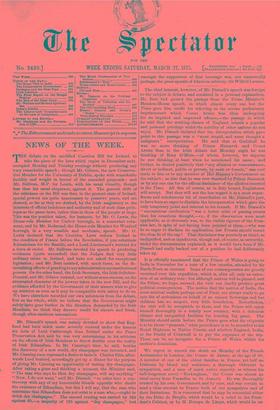The chief interest, however, of Mr. Disraeli's speech was foreign
to the subject in debate, and consisted in a personal explanation.' Mr. Butt had quoted the passage from the Prime Minister's Mansion-House speech, in which almost every one but the' Times gave him credit for referring to the severe preliminary imprisonment which Count Arnim was then undergoing for an imputed and unproved offence,—the passage in which he said that the working-classes of England inherit a popular and personal privilege which the nobility of other nations do not enjoy. Mr. Disraeli declared that the interpretation which gave point to this passage was a "most stupid, and some thought a malignant" interpretation. He said that at Guildhall he was no more thinking of Prince Bismarck and Count Arnim than in the Irish debate last Monday night he was thinking of Rory O'More,—of whom, however, we suppose he was thinking, at least when he mentioned his name ; and further, he denied positively that "any allusion or remonstrance, direct or indirect, public or private, by male or female," was ever made to him or to any member of Her Majesty's Government on the subject ; as also that he was ever thanked by Prince Bismarck or by any one else for the official disclaimer of the allusion inserted in the Times. All this of course, as in duty bound, Englishmen will accept. But they will not the less regard it as a most super- fluous and mischievous bit of conciliation on Mr. Disraeli's part, to have been so eager to disclaim the interpretation which gave the only temporary point and interest to his remark. If Mr. Disraeli's "unconscious cerebration" was a better critic of passing events than his conscious thought,—i.e., if the observation were most applicable, as it obviously was, to the visible rigours of the Prus- sian law, in spite of not having been pointed at them,—why was he so eager to disclaim its application, lest Prussia should resent the close fit of the cap? That disclaimer was precisely as timid, as undignified, and as injudicious, though not, of course, as unworthy, under the circumstances explained, as it would have been if Mr. Disraeli had really backed out of a position he had deliberately taken up.


































